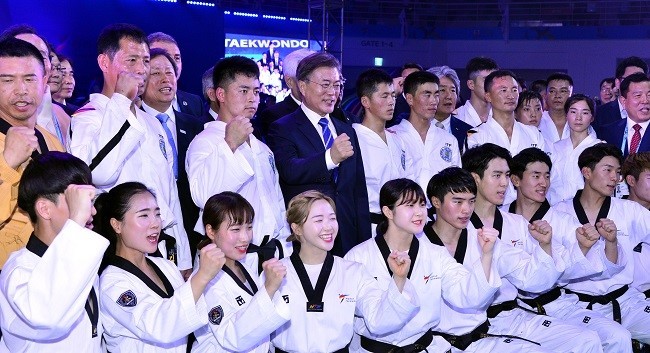[News Focus] Moon proposes inter-Korean team for PyeongChang Olympics
By Shin Hyon-heePublished : June 25, 2017 - 15:45
President Moon Jae-in on Saturday proposed that the two Koreas form a unified team to take part in the 2018 Winter Games in PyeongChang, pinning high hopes on sports as a driver to kick-start cross-border exchanges that have for years been at a standstill.
He made the overture at the opening ceremony of the 2017 World Taekwondo Championships in Muju, North Jeolla Province, to which the North sent a rare demonstration team.
The liberal president, who envisions a restart of dialogue for a thaw with the isolated neighbor, recalled the instance of 1991, when the two Koreas competed for the first time as one team for the World Table Tennis Championships and FIFA World Youth Championship. In 2000, athletes from the two countries marched together behind a unification flag as the Summer Games in Sydney kicked off.
He made the overture at the opening ceremony of the 2017 World Taekwondo Championships in Muju, North Jeolla Province, to which the North sent a rare demonstration team.
The liberal president, who envisions a restart of dialogue for a thaw with the isolated neighbor, recalled the instance of 1991, when the two Koreas competed for the first time as one team for the World Table Tennis Championships and FIFA World Youth Championship. In 2000, athletes from the two countries marched together behind a unification flag as the Summer Games in Sydney kicked off.

“I hope our achievement in taekwondo will lead to the PyeongChang Winter Olympics. I believe that if a North Korean delegation participates, it will greatly contribute to realizing the Olympic values of mankind’s harmony and world peace,” Moon said in a congratulatory address.
“I wish to see the glory of 1991 again. I would like to feel the sensation of 2000 again. I hope North Korea’s cheering squad will also come along so that we could set a milestone for inter-Korean reconciliation.”
The speech was closely watched by Chang Ung, the North’s sole member of the International Olympic Committee. Jang arrived here Friday, leading the 32-strong International Taekwondo Federation demonstration team, and joined by three other Pyongyang officials.
Moon also requested Chang’s cooperation, stressing the significance of the ongoing event as the venue for the first cross-border sports exchange since he took office on May 10.
“Once adversaries, the US, China, and Vietnam achieved peace through Ping-Pong diplomacy,” the president said. “I believe in the strength of sports that has been establishing peace.”
The offer for the joint team reflects his bid to revive ties with Pyongyang starting with nonpolitical areas while floating a nuclear freeze agreement.
Over the past month, the Moon administration has also granted approval for civic groups’ plans to provide humanitarian assistance and resume religious exchanges. Marking the 17th anniversary for a watershed inter-Korean peace declaration in 2000 on June 15, he said he would pursue talks with Pyongyang if it halts nuclear and missile tests.
With North Korean leader Kim Jong-un having promoted sports at home as an avid fan himself, the PyeongChang Olympics to be held in Gangwon Province could mean a chance for the nascent leadership to engage the regime with relatively less political burden, analysts say.
Choi Jong-kun, a professor in political science and international studies at Yonsei University who has been advising Moon since long before the campaign period, has said his administration wants to use the event as a platform to reinitiate inter-Korean talks designed to induce a moratorium on the North’s nuclear and missile tests in return for economic incentives such as a reopening of the Kaesong industrial park and Geumgangsan tours.
“If we could manage to perk up the mood through the Olympics and then expand interactions, we will be able to send a meaningful signal about our intention,” Choi told The Korea Herald last month. “And if the North takes explicit steps on denuclearization, we may take our own corresponding measures, such as on Kaesong and Geumgangsan.”
Given heightened tensions and the absence of communication channels, the event could “set the mood” for cross-border dialogue, said Koh Yu-hwan, a professor in North Korean studies of Dongguk University in Seoul.
“The proposal was apparently intended to pursue sports exchanges regardless of, or rather to improve, the political situation, and the PyeongChang Olympics would be a key occasion,” Koh said Sunday.
“Just like the Muju case, North Korean officials would come here together with the athletes’ delegation. Then there will most likely be direct and indirect talks with the South’s government during which the sides may sound out each other’s stances and explore what to do to improve the relationship going forward.”
By Shin Hyon-hee (heeshin@heraldcorp.com) and Jung Min-kyung (mkjung@heraldcorp.com)









![[Kim Seong-kon] Democracy and the future of South Korea](http://res.heraldm.com/phpwas/restmb_idxmake.php?idx=644&simg=/content/image/2024/04/16/20240416050802_0.jpg&u=)







![[KH Explains] Hyundai's full hybrid edge to pay off amid slow transition to pure EVs](http://res.heraldm.com/phpwas/restmb_idxmake.php?idx=652&simg=/content/image/2024/04/18/20240418050645_0.jpg&u=20240418181020)

![[Today’s K-pop] Zico drops snippet of collaboration with Jennie](http://res.heraldm.com/phpwas/restmb_idxmake.php?idx=642&simg=/content/image/2024/04/18/20240418050702_0.jpg&u=)